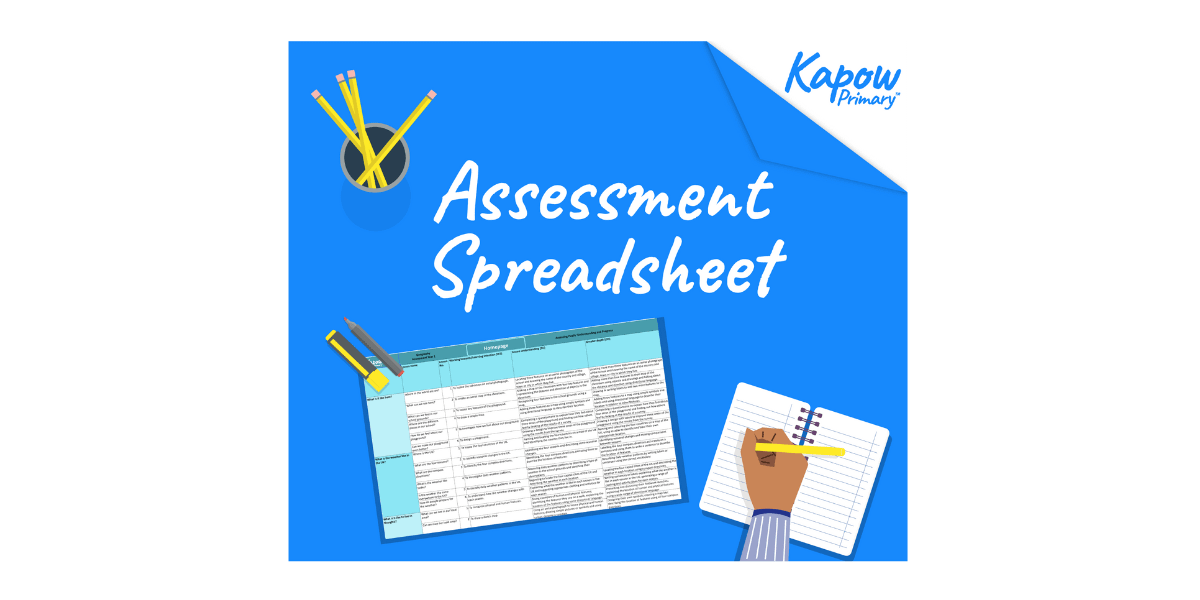Assessment Tools And Tips For Foundation Subjects
Written by Kapow Primary
Published on 1st June 2023
Last Updated: 26th April 2024
Written by Kapow Primary
Published on 1st June 2023
Last Updated: 26th April 2024

What is the best form of foundation subject assessment for primary school children? There’s no straightforward answer to this question, and schools differ in how they approach assessment. This is why, at Kapow Primary, we have developed a range of assessment tools for our schemes of work, including:
We understand that finding a suitable assessment format for foundation subjects can be challenging; creative subjects such as Art and design and Music simply don’t lend themselves to formal assessment methods, yet schools require evidence that shows pupil progress.
Our assessment tools are suitable for different assessment styles. Below is a comprehensive guide on what they are and how to utilise them.
Every key stage 1 and key stage 2 Kapow Primary topic has a corresponding unit quiz. The quiz questions are to be used by the whole class on the interactive whiteboard. Each quiz consists of 5–10 questions, varying according to the topic and the key stage; the questions are multiple-choice except for the final question, which is open-ended. There is a printable answer sheet for children to fill in.

Most of our key stage 1 and key stage 2 lesson plans have a knowledge catcher for each unit. These one-page documents show an image relating to the topic, accompanied by open-ended questions. The number of questions and their complexity vary depending on the year group.

At the start of the unit, knowledge catchers are useful to create interest in the new topic and assess what pupils already know. The teacher may show just the image, or even part of the image, to children as a sneak preview to elicit their thoughts and ideas.
At the end of the unit, pupils can answer the questions in more detail. They may like to discuss the answers with other children first, but we recommend letting them answer the questions independently so you can assess individual understanding.
Our History units use skills catchers instead of knowledge catchers. They work in the same way as knowledge catchers but with a focus on assessing the development of skills rather than knowledge acquisition. One of our Year 1 Geography units is heavily skills-based, so this also has a skills catcher.
In RSE & PSHE, our knowledge catchers include mind maps and table-style resources as well as question sheets. This is to reflect the wider variety of topics covered in these subject units.
For formative assessment that tracks pupil data, we’ve created assessment spreadsheets that you can use to assess the progress of individual pupils against each learning objective and the assessment guidelines provided in the lesson plans.

These documents are fully editable spreadsheets that enable you to track subject data across the whole school. The first sheet provides guidance about how to use them, and the objectives are pre-populated for every lesson in each unit for all year groups. You can update them with information about the progress of every child; their attainment will be calculated to show the percentages of children who are working at different stages.
This assessment format shows you, at a glance, how each child and each year group is performing. The spreadsheets are highly informative for compiling end-of-year reports or school subject data.
To support pupils in the early years foundation stage (EYFS), we present prompts for learning in each lesson, aimed at encouraging children to discuss their work with an adult. Additionally, we provide observation questions for teachers that align with early learning goals. These observations can be utilised as part of the continuous pupil assessment in the early years’ curriculum.
Here are some other ideas that you can apply to different subject areas for assessing primary school children in foundation subjects:
Kapow Primary’s knowledge organisers are a useful tool for informal learning assessment. There are many ways to use knowledge organisers for this purpose such as removing key vocabulary, asking pupils to annotate them after a lesson or using them to test each other.
Teachers can use this in many different ways. We like it for Art and design, where pupils can critique their own and someone else’s work with guidance from a teacher. This form of Assessment for Learning (AfL) is motivational and promotes independent thinking and confidence.
One way to start foundation subject topics is with a baseline assessment such as mind mapping or ‘Draw and Write’. This is particularly useful in RSE & PSHE. It helps to identify misconceptions and gaps in children’s knowledge.
We recommend using games as one method of formative foreign language assessment in our French scheme of work. Children love games and enjoy repeating the same ones over and over again. Ideally, choose games where the structure is the same but the language can be changed.
Early on in Year 3, pupils following Kapow Primary’s French scheme of work play simple games such as ‘Splat’, ‘Kim’s game’ and ‘True or false?’ to learn colours. These games, once established, can be used time and time again to assess vocabulary recall in other units.
Kapow Primary’s lesson plans have built-in key questions that you can use for AfL relating to each lesson.
In certain foundation subjects, you can’t open children’s books to demonstrate evidence of learning, so you have to find other ways to do it. It’s helpful to collect video and audio recordings in subjects such as Music, French, Computing, and RSE & PSHE to show evidence of progress.
At Kapow Primary, our comprehensive schemes of work include ready-made practical assessment resources that help teachers to assess pupils confidently and efficiently. To see how our assessment tools can support you, we offer a free trial that gives you access to all our foundation subjects and our supporting resources.